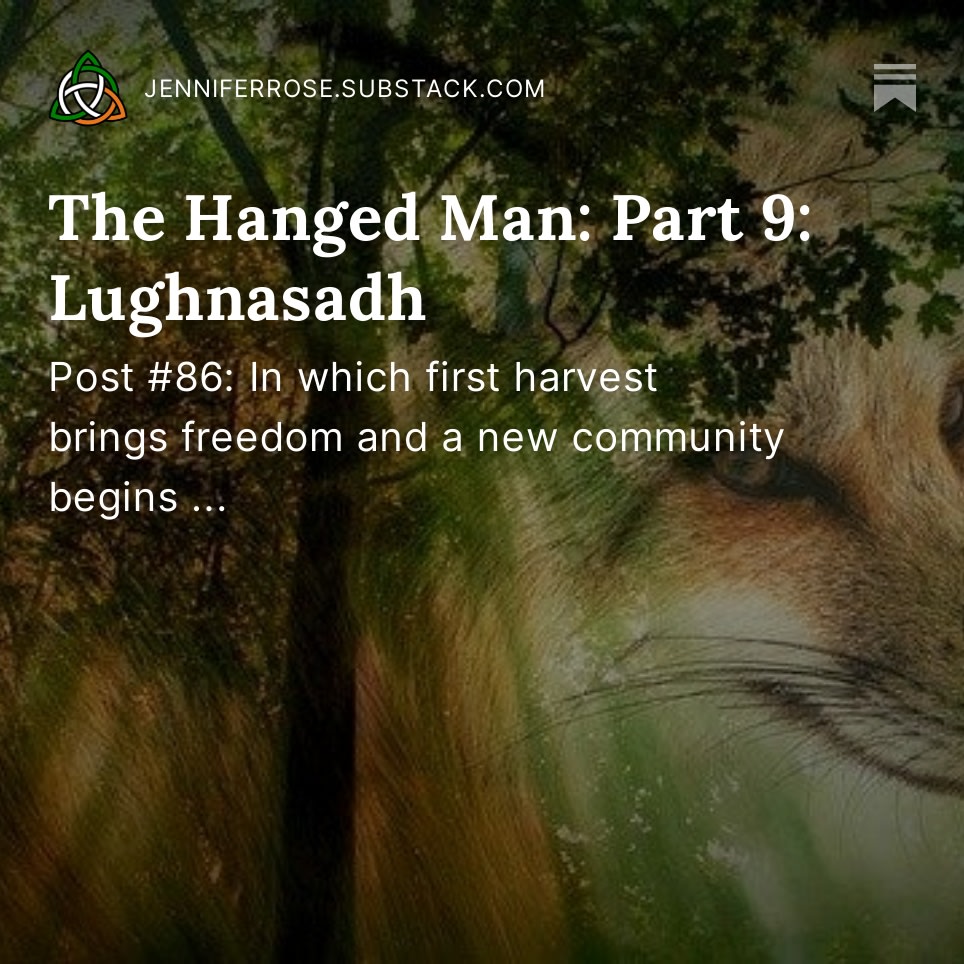by Jenny Rose | Mar 2, 2024 | A Flourishing Woman, Mind
A couple of weeks ago a discussion I was involved in touched fleetingly upon the idea of an internal locked room, where we keep our most private thoughts and feelings. I’ve been thinking about the concept ever since, fascinated by the metaphor.

Photo by John Salvino on Unsplash
What’s in my locked room?
I don’t know. I don’t want to know, and I don’t want anyone else to know. That’s why I lock that stuff up!
But what’s in there?
I can’t let it go.
As a storyteller, I immediately recognize this common theme running through oral stories and folklore from all traditions. Something is locked or hidden. It’s forbidden to look. Lovers make a bargain. Authority demands obedience. The consequences of looking are not fully revealed, but it’s forbidden to look!
Someone always looks. Remember Pandora? Consequences ensue.
I’ve never really thought about an internal locked room until now; never considered how big it might be or what’s behind the door. I haven’t realized whatever my room contains is locked away from me as well as everyone else. All the memories I don’t want to remember. The hurts, the fears, the terrible thoughts, my unforgiveable deeds. The things about myself I can’t love.
Is it unhealthy to have a locked room? I assume everyone has one, but maybe not. I’m not uncomfortable about the presence of mine, but I question the wisdom of locking myself out. The road to self-love is long and arduous; can I practice it if I still don’t want to face (and accept or forgive) parts of who I am? That doesn’t feel like self-love.
Is a locked room adaptive or maladaptive? Could it be both? Does size matter? (You know what I mean. The size of the room!) Maybe the size is irrelevant and it’s the contents that count. 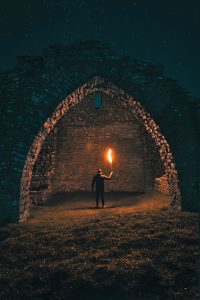
Why do we put things in our locked room? Why did I put things in mine?
Well. I’m ashamed. Or I’m afraid of emotional pain, conflict, or of hurting others. Maybe it’s something I’m not ready to forgive myself or others for. Maybe I lock it away to fester?
Ugh.
So is the locked room about keeping me safe or others safe?
Both, I think. Others safe from me and me safe from others. But it’s also a holding place where I keep things I don’t want to deal with.
I’ve read Radical Honesty by Brad Blanton. It gave me the horrors. I’m unable to see radical honesty as a pathway to healthy cooperation and collaboration. For me, privacy is a need, not only in an external sense of spending time in solitude, but also in the internal sense. This is unsurprising from a highly sensitive, empathic person who has experienced emotional trauma and abuse. I need my privacy and I’m intensely protective of the privacy of others.
I think a locked room is an essential piece of healthy functioning.
However, we as a species have a dreadful propensity for carrying things too far.
Not me, of course. I never do that.
How do we decide what’s appropriate to share and what’s not? Working with patients and patrons at the pool facility where I’m employed, I constantly feel battered with oversharing. People, especially seniors, are lonely. They have a lifetime of memories and experience. They have health issues that frighten them. They need to talk. My team and I do our best to be compassionate listeners.
But sometimes I wish I could forget what I’ve heard. Secrets are safe with me, but the feelings that come with them are burdensome; as an empath I’ve struggled all my life to avoid taking on the emotions of others. Mostly not very successfully.
Does everyone need some privacy? Is it a continuum? Do I need too much privacy? How much is too much? Who gets to decide? Is there such a thing as being too open, too un-private, if you will? Or does everyone have a locked room, even if it’s only the size of a mousehole?
Rooms. What happens in private rooms? Clutter. Dust bunnies. Cat hair. Hoarding. Loneliness. Despair. Death. Birth. Love. Sex. Creativity. Cooking. Self-care. Self-harm. Sleeping. Using the toilet. Distraction. Playing out addictions. Violence. Weeping. Exercising. Entertainment. The human activities of daily living we all engage in.
A locked room could be a dark and bitter dungeon or a light and airy penthouse. What kind of a locked room do I have? What kind do I want? 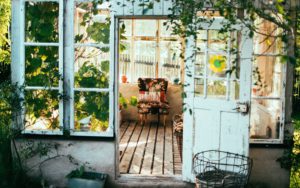
I hate clutter. Is my locked room cluttered? Surely not! Well, maybe. There’s 60 years’ worth of stuff in there! It’s spring. I kind of want to unlock it, open a window, air the place out. Maybe tidy up a little? Let go of some stuff? Sort? Organize? Would that be so terrible, so impossibly painful?
I have a sneaking suspicion some of what’s in my locked room is not even mine, but things given to me. Or imposed on me. I inherited toxic beliefs, experiences, and feelings from generations before me and believed it was my job to carry and preserve them.
Why am I storing what doesn’t belong to me?
Perhaps my locked room contains parts of myself I tried to get rid of and now need. Treasure, if you will. Maybe exploring it could be in part an act of reclamation.
Maybe if I open the door a tower of horror will fall on top of me and I’ll be smothered. Maybe if I don’t open the door green slime will ooze out from under it.
What’s in there?
I have some answers. My relationship with a cat named Ranger is in there, and no, I don’t want to talk about it. Every room needs a cat, in any case.
Health struggles (not serious) I’m largely unwilling to share are in there, although I have recently cracked the door and let some of them out. Carefully. Nothing bad happened.
My relationship with my children, one in particular, is in there. Now and then I’ve let a small amount of that out, too, but not often, not much, and only to my most trusted female friend.
My locked room is filled with passion. Passionate feelings of all kinds I’ve been hiding and repressing all my life. They’re strong and intense and I’ve been brutally taught they’re ugly, frightening, and obscene.
This has lately become a problem because rage is finding its way out of my locked room with disturbing results. Having escaped the room, it has no intention of being stuffed back in there and restrained. It’s a daily challenge at home, at work, and in the most unexpected contexts. It has stories to tell and I’m listening, reluctantly, but it frightens me and I’m ashamed of it. I thought I would always be able to keep it locked up and controlled. It appears I was wrong.
What else? I don’t know. These are the only specifics I can come up with. I’ll probably become conscious of more, now that I’m thinking about it.
I won’t fling the door of my locked room open and do a thorough cleanout because it’s the wellspring of my creativity, any small wisdom I’ve gained, and my empathy. As a gardener and a writer, I believe in compost. Something wild and primal in me, nurtured by Baba Yaga, loves the stink, the rot, the death, the blood, because these are the cradle of life. Nature does not waste. It’s all recycled. My experience of pain and passion empowers my writing, power I would not lessen in spite of its high price. Such power is born and rooted in fecund darkness, in muck mixed with blood and tears, in the edge of chaos, not in a bright, shining, passionless, well-aired room.
Yet I fear the passion the most. It feels like too much to release or keep contained. I fear its power to tear me apart, which is why I locked it away in the first place, and I fear its potential to hurt others. Much of it fuels my writing. I bleed some off with exercise, especially dance. But those are safety valves rather than open doors. Part of me wants to set my passion free. But for now most of it will stay in my locked room.
Questions:
- Do you have an internal locked room? How do you feel about it?
- Do you believe emotional privacy is essential, or do you think it’s unhealthy? Is it a need on a continuum?
- Are you familiar with the concept of radical honesty? What do you think about it?
Leave a comment below!
To read my fiction, serially published free every week, go here: 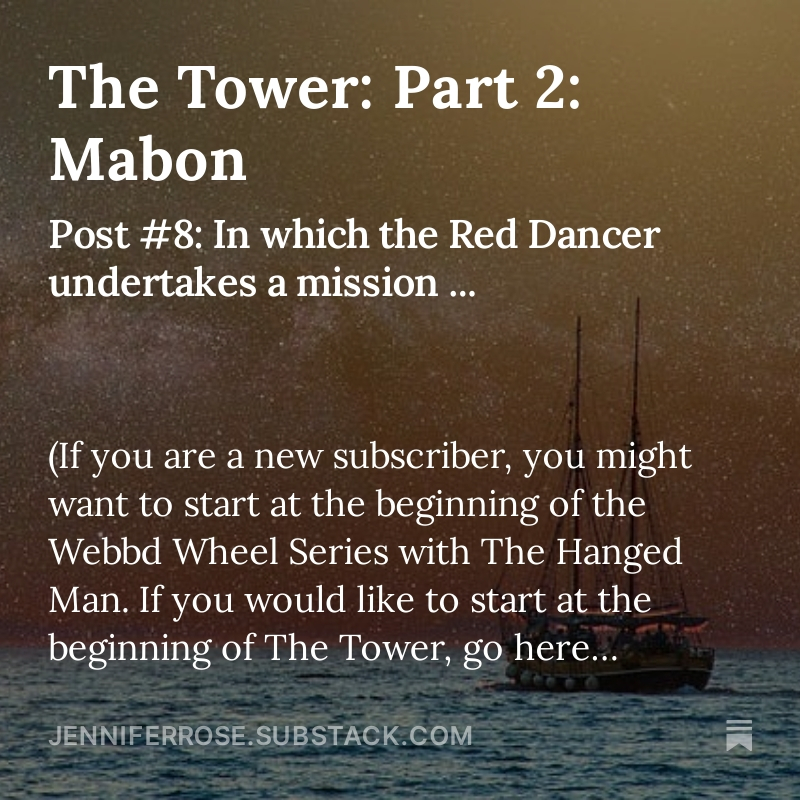
by Jenny Rose | Dec 9, 2023 | A Flourishing Woman, Creativity
Turning and turning in the widening gyre
The falcon cannot hear the falconer;
Things fall apart; the centre cannot hold.
–From “The Second Coming” by W.B. Yeats
The line “the centre cannot hold,” has been running through my mind for several weeks, through all the time I’ve been sick with COVID and whatever nasty virus followed in its wake, and my slow recovery. “The centre cannot hold.” I found a quiet moment and looked it up. I knew it was poetry, but I couldn’t remember who wrote it or what the poem was. Thank you, Google!
W.B. Yeats, of course.
I suppose it’s a common experience to feel we’ve lost our center, our groundedness, when someone significant in our life dies, as my mother just has. I’ve fought against the feeling because over the years I’ve worked so hard to individuate from my mother, to reclaim my right to center my life around something other than her. If she was not the center of my life, why do I feel things have fallen apart since she died in August?

Photo by NASA on Unsplash
Did I fail to reclaim my power, define myself and my value apart from our relationship? Has all my work been for nothing? Are my healing and growth an illusion?
I have been afraid of answering these questions.
When I reread the first three lines of the poem, I first imagined myself as the falconer and the falcon as … my soul? My joy? My wisest self? My intuition? All those and none of those, exactly. The falcon seemed like a piece of myself I lost a long, long time ago when I was child, a piece I struggled through many years and miles to find and reclaim, and now is lost again. It can’t hear me, and I can’t hear it. It feels unbearable. My center didn’t hold. Why didn’t it hold? Did I do something wrong? How do I call it back to me?
And I want to call it back, not haul it back by its jesses. In fact, why is the falcon restrained at all? If it’s truly mine and we belong together, why is it leashed? The idea disturbs me. I want it to be free. I’ve worked too long and hard for my own freedom to relish restraining any other creature. I note I assume the falcon is leashed. The poem doesn’t explicitly say so. Interesting.
Maybe my assumption of leash and jesses reflects all the ways I’ve restrained myself. As a child I internalized restraint. I had to. Everyone else felt free to throw self-control to the winds. Is my feeling of my center not holding asking me to release myself further? Is it time for deeper faith and trust in myself?
As I typed those three lines onto the page to begin this post, I imagined another picture in which my mother was the falconer and I the falcon. She no longer holds the leash. I am free. I have flown away from the only center I was allowed to have and now I’m overwhelmed by my freedom. I don’t know how to be wild. I don’t know how to live without the restraining leather jesses around my slender legs. What if I can’t? What if I perish? Must I find a new falconer to hold the end of my leash? What if my freedom is a mistake and I’m not fit to be free? What if I’ve lost the ability to fly free?
Ugh. Goosebumps.
Don’t get carried away, I say to myself. Slow down. We’re talking about emotional freedom versus physical freedom. You’ve been flying in an ever-widening gyre for years.
What’s changed is that leash, woven of blood and bone and love, woven of years and empathy and need, guilt and shame and obligation, too strong to ever be severed … except, it turns out, by Death.
What do we center around?

Photo by Bryan Goff on Unsplash
It changes, doesn’t it? In my first 20 years I centered around my family of origin. When I was in my 20s and beyond I centered around a man and my children. Work was in there, too. And my family of origin, particularly my mother, who was not pleased to be sharing the center. The proverbial 3-ring circus. It went on like that until my children emancipated and, to be honest, for some time after. Then, as they slowly faded out of my center, being far away and engrossed in their own lives, I centered around some man (but not the same one; I’m a slow learner) and my mother. Slowly, writing began to nudge for a place in the center as well.
This created real problems. Mom could never tolerate sharing. I was used to her competition with the kids and whatever man I was involved with but the writing would have created a real threat, so I hid it. The more I hid it, kept it inviolate and safe from outside sabotage, the more I centered around it, and the more I centered around it the more threatened she felt, though I’m not sure her reaction was conscious and she had no idea what she was fighting against. She just knew she didn’t have all of me anymore.
She was right to feel threatened, because writing eventually tore me away from her physically and geographically, a thing that had never happened before and a last betrayal she never forgave.
In the stresses and strains of the last couple of years, I lost writing out of my center. Oh, I still did it. I blogged and serial published. I journaled. But as Mom’s health and sanity crumbled, she became my center once again, this time to the exclusion of everything else. Work (generally part of the center for all of us) competed, keeping me sane, physically fit, and anchoring me into a community of friends, but Mom once again became the primary gravitational pull in my center. My days and nights were full of her. I had less and less respite and the intensity increased daily, winding around my life more and more tightly, and then …
She died. In the middle of the night, a night in which I lay awake in Maine while my brother sat vigil with her halfway across the country in Colorado.
When I write it all out like this, I can understand why I’ve felt so dazed. I can feel some grace for myself.
The one thing that’s always been in the center is gone.
“The centre cannot hold …”
Being too old to have any desire to put a man back in the center (been there, done that), and loving my job while realizing it’s not big enough to define me, I turn once again to the truest, most joyful, wildest part of my life: writing.
And that’s scary. If I let writing take all the space, time and energy in the center, what will happen? I don’t even make money with it!
I make joy with it instead. Joy, connection, contribution, authenticity. Writing is not a black hole of failure. It does meet my needs. When I write, I actually feel good enough and sometimes even better than that! No wonder I feel bewildered.
As I write this, it occurs to me for the first time to not only allow things to fall apart, but to participate actively in the falling away and, falling down. To dance in the ruins, even as I weep. I’m reminded of a Rumi quote:
“Dance, when you’re broken open. Dance, if you’ve torn the bandage off. Dance in the middle of the fighting. Dance in your blood. Dance when you’re perfectly free.”
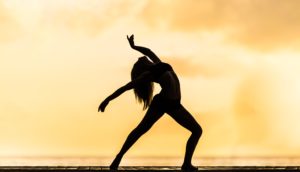
Photo by David Hofmann on Unsplash
Things fell apart. The center did not hold. Change, in other words. Life. Which is to say Death.
So, an unexpected ending to this post. Things are falling apart. I’m ready to stop trying to hold them together. It’s time to let go. Mom already has. Now it’s my turn. What lives in our center changes as we change. It’s time now for me to choose my center, choose it freely without guilt or shame.
Sometimes things fall apart and the center cannot hold.
So we find a new one.
Questions:
- What’s in your center?
- If you were free to choose your center, what would you chose?
- How many things compete for your center? Could you reduce the gravitational pull of your center?
- If your life changed in some dramatic way and you were forced to find a new center, how would you go about doing that?
- Is your center all about others, or do you have something there for yourself, too?
Leave a comment below! To read my fiction, serially published free every week, go here: 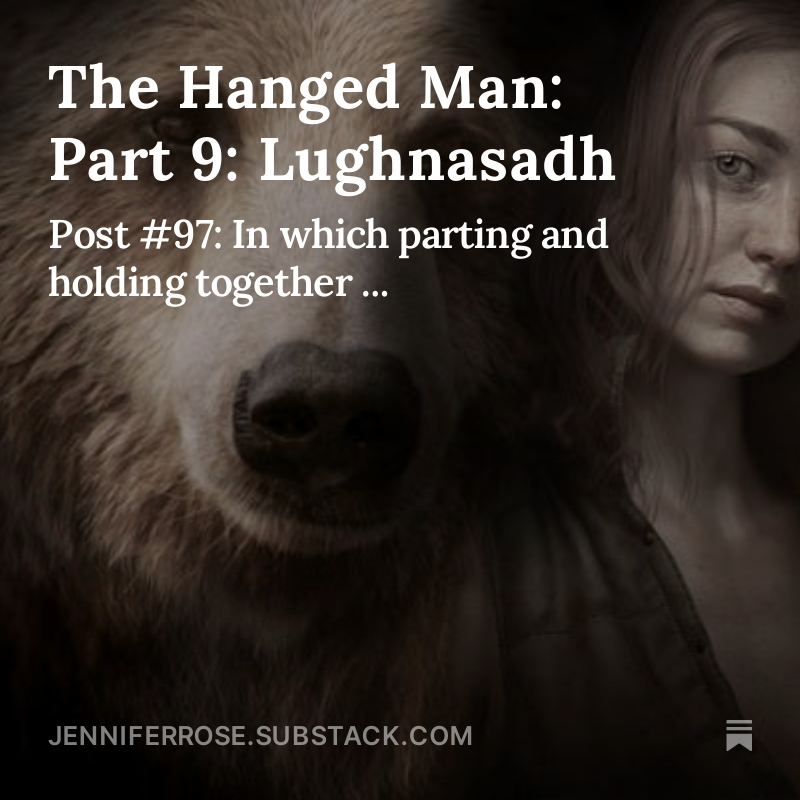
by Jenny Rose | Nov 25, 2023 | A Flourishing Woman, Body
In the last few months I have noticed a pattern as I teach private swim lessons.
It first caught my attention over the summer as I worked with a six-year-old in her home pool. She and I have worked together for some years. We have a good relationship built on trust and affection. She’s strong and big for her age, and she’s a tiger, assertive, competitive, stubborn, determined. She’s focused on progression through Red Cross Learn-to-Swim levels. She’s less interested in the skill-building than the card proclaiming her a Level ___ swimmer, and she wants the card now.

Photo by Chris Kristiansen on Unsplash
I started out her summer lessons the way I always do, with a review of the skills I knew she had already mastered. Then we began working on next-level skills. Except things fell apart. I began to feel frustrated. Her behavior, instead of sunny and eager (she was always waiting in the water for me until this), became oppositional. She stopped laughing with me. She stopped looking me in the eye. She stopped cooperating. She wouldn’t follow directions, she had to be coaxed into the water, and suddenly it wasn’t fun for either of us.
Her mom and I were puzzled. We agreed to take a couple of weeks off and regroup. My little student seemed relieved. During that time I thought about things and my student had some talks with her parents as we all tried to figure out what was wrong. Young children often lack the language to communicate their difficulties. Adults need to decode the behavior and provide the language.
I threw away my lesson plans for the next level and worked on games incorporating skills she already had. I made sure she knew our next lesson would be games. When I got to her house, she was able to tell me, with her mom’s support, that she didn’t want to learn some of the new skills I was presenting.
I suddenly recalled I was working with a six-year-old. Big, strong, determined, yes. But six years old! The level she and I had reached is typically a skill set nine to eleven-year-olds are working on.
Too much, too fast. Her competitiveness and determination had outstripped her physical and developmental ability, and in my delight in teaching and sharing my love for swimming, I simply forgot what was age-appropriate.
So, we spent the summer playing games and giggling. We practiced all the skills she already had, and we worked on some new ones, too, but she didn’t know that because they were games. If she didn’t like the game, we stopped immediately and did something else. She made up some games, too. We had a lot of fun. She waited in the water for me and pouted when our lessons ended. We were back in business.
I spoke privately with her mom and we agreed to slow down. This little girl needs time. Time to grow. Time to develop. Time to play and simply enjoy the water. Next summer she’ll be seven. If I work with her again, I’ll pay attention. She may be ready for next-level skills. She may not. But this time I’ll adjust more quickly, and she’ll have better language skills, too.
I have been observing this pattern during the autumn months as I teach. Sometimes kids want to learn more but we don’t have a lot more to teach them. Sometimes they want to learn more, or their parents want them to learn more, but they’re simply not ready physically or developmentally. An activity that used to be fun and easy starts to be stressful. Parents are frustrated. I’m not having fun. Children are uncooperative.
I’ve been thinking about time lately because in October I caught COVID for the first time and I’ve been sick ever since. I took good care of myself during COVID, in part because I was too sick to fight it. As I began to feel better, I slowly started exercising again. I didn’t want to slide backwards or develop a secondary infection. I was worried about weight loss and weakness, as well as my fatigue and lack of endurance. I gradually began walking to work again, and doing a mile at a time on the elliptical. I even got back in the pool and did an easy half a mile instead of my usual ¾ of a mile with intermittent sprinting.
I was just beginning to feel better when I got sick again. Not with COVID and not as sick, but I filled up with congestion and started to cough.

Photo by Travis Bozeman on Unsplash
So, it’s been doctor visits. More nasal swab testing. Masks at work. Shortened shifts. Teaching lessons from the deck rather than in the water. No gym. No swimming. No walking to work.
The doctor keeps saying rest. My friends keep saying rest. I am resting, I swear it! I don’t have a lot of choice. If I do housework for an hour I’m worn out. I can rest, but sleep has been hard to come by because when I lie down I start to cough and nothing really stops it. The nights have been hard. And haunted.
I’ve been dreaming about my mother, who died in August. Bad dreams, where she’s in trouble and I’m trying to rescue her. Often we’re in water, which is ridiculous because Mom hated the water. Often we’re in the dark, but I can hear her end-stage breathing and death rattle and I grope through the dream, trying to find her. Sometimes I find her and get my arms around her, but then I wake up. In fact, Mom hated to be touched and I never held her the way I do in my dreams. Only in her deep dementia would she tolerate touch. The dreams hurt me with their promise of loving contact that never happened and now never will happen. I doze in my recliner and wake up weeping.
I want to move, to be at work, to go out and rake leaves, to scrub the kitchen floor. Something. Anything. I trail into the kitchen, make another cup of tea, have another half cup of chicken soup, read a few pages, write a bit. I get in the car to go to work instead of walking (everyone at works frowns at me when they find out I walked), and I’m resentful. I want my life back. I want my strong, fit body back. I want my energy back. I want it back NOW.
And, clearly, I need time. I don’t want it … but I need it. I suppose it doesn’t much matter if my experience is post-COVID, or post-whatever-this-last-virus was or grief or trauma or just getting old (!). Whatever it is, I am not in charge, and my stubbornness and determination are presently more than my physical and perhaps emotional reality can live up to.
Time is enigmatic, isn’t it? We say time heals all wounds. Does it, or does it just give us a chance to process our wounds, to clean them out, breathe on them, bind them up and learn to live with them? How can I help myself? What am I supposed to be doing with all this unwanted time? I think of my little swimmer. She doesn’t need to do anything. She’s perfect. She simply needs to give herself some time to grow. That’s it. Time does the work. Our job is to allow it to do the work.
This is unsatisfying. I’ve read that rest is productive, which makes me mad. It cannot be true. I can’t remember ever feeling loved, valued, or wanted because I rested well. Quite the reverse. (On the other hand, when has unceasing production ever worked to buy love, value, or a sense of being wanted? Never.) I have a feeling Time doesn’t need me to do anything, at least not anything I’m not already doing. Another cup of tea. All the calories I can take in. Rest. Tears. Dreams. Writing. Reading and dozing on the couch with the cats.

Photo by Benjamin Combs on Unsplash
Time.
I worked two days Thanksgiving week before having five days off. My physical upper respiratory symptoms are certainly better. Normal sleep patterns are returning. Yet a dragging fatigue and bewildered feeling remain. “It’s detox,” my massage therapist says. “It’s transformation,” the wisest, deepest part of me says. “It’s rebirth,” my Tarot cards say.
It takes time. Everyone agrees on that one.
I remember my little swim student, outraged tears in her eyes. “I’m still a Level ___, right? You won’t take away my Level ___?”
“No, sweetie. You haven’t lost anything. It’s all still yours. You’re just not quite ready to go on to the next level. You need some time …”
I hugged her and gave her a kiss, told her I’d see her again next summer if she wanted lessons. She believed me, reluctantly. She’s in a dance class this winter. That will distract her, I hope.
Now I need to put my arms around myself. My life is not passing me by. I’ll exercise again. I’ll put the weight back on. I’ll get strong, sleep well, stop coughing.
I just need some more time.
Questions:
- Do you think rest is productive? In what way(s)?
- Do you think of time as an ally or an adversary?
- Do you think time actually heals, or does it just help us come to terms with what is?
- What does rest mean to you?
Leave a comment below!
To read my fiction, serially published free every week, go here: 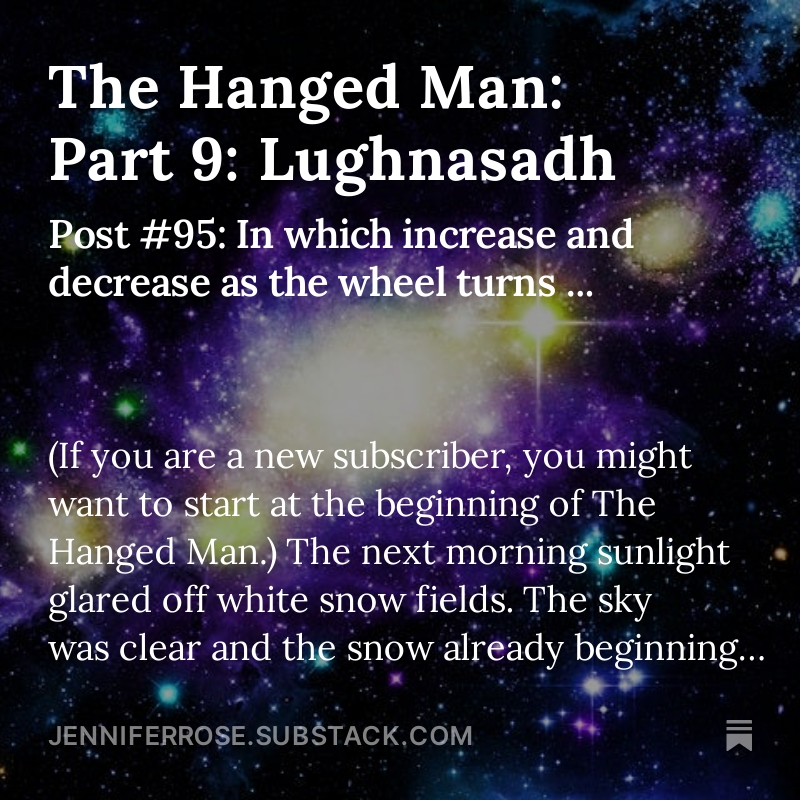
by Jenny Rose | Oct 21, 2023 | A Flourishing Woman, Body
I came down with COVID this week. It’s the first time I’ve had it, for which I’m thankful, as I’ve been diligent about vaccinations and I’m sure they are mitigating the virus. Three weeks ago I received the latest vaccination, in fact. (And no, I don’t think that’s why I got COVID!) 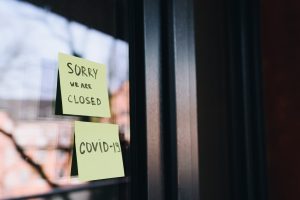
In our current world a positive COVID test is an iron-bound, all-purpose excuse for downing tools, stepping away, and spending some quiet time in solitude. So here I am, on the bench (or in my case, a comfy couch) instead of making my way through my usual work week and routines.
I haven’t been afraid of winding up in the hospital on a ventilator. I’m not especially high risk and in very good health. I’ve been resigned, more than anything else. Resigned that I unknowingly exposed my friends and coworkers before I knew what was happening. Resigned that this is a different viral experience than I’ve ever had before. Resigned that someone else taught my group swimming lessons and enjoyed the kids. Resigned to the fact that now we all have to mask for a time at work.
I’ve been miserable with fever, aches, congestion, and difficulty breathing. The physical symptoms are easing; however, I have entirely lost both taste and smell, perhaps the most distressing symptom of all, in part because it’s so different. Yesterday I ventured out for a walk.
It was breezy and grey with rain moving in, the air warm and soft. I took a short neighborhood walk, enjoying being outside and moving, but struggling with shortness of breath, disoriented by my inability to smell the rain coming and the crisping leaves. I feel cut off from my greatest source of solace, the natural world. I will continue to walk every day because my body needs it, but my joy in being outside is painfully diminished.
When I completed my test route, I felt too tired to do more. I came home and discovered I’d been gone less than 10 minutes.
At times like this I bless my passion for reading. I’ve had eye inflammation and itching with this virus; a symptom I’ve never had before. It worsens as my fever increases and makes looking at a screen or watching TV miserable, as well as sitting in any kind of sunlight. However, I can turn on a lamp and read until I doze, then wake and read some more. This passes the time, keeps me quiet, and distracts me from my present experience.
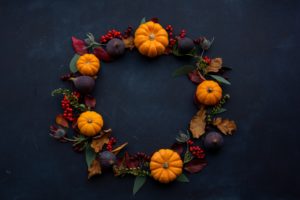
Photo by Joanna Kosinska on Unsplash
This morning I walked again in a light rain. It’s been a dull-colored fall here. Some leaves are finally starting to turn; other trees are mostly bare already. This time I was ready for scent blindness. I turned away from what I couldn’t do and feasted my eyes on the rich colors of fall-blooming flowers and the leaves. A humid breeze fanned my cheek. I focused on breathing, filling my weary lungs with the fresh, damp air, exhaling as well as I could through my nose. I paid attention to what I heard: crows squabbling, an occasional passing car, a barking dog, the subtle background sound of the rain. I walked a longer distance than yesterday.
I haven’t run a fever from more than 24 hours and my throat feels normal again. Progress, although my heart thumps uncomfortably when I’m up and doing things and I have the lingering feeling I’m not getting quite enough air. Still, symptoms are clearly abating.
Benches are not comfortable, for the most part. No back support. Hard under the ass. Sitting on the sidelines watching others live their lives when we can’t participate much in ours is discouraging. So much of my daily centering, comfort, and self-care are bound up with scent. I could not have anticipated how devastated I feel without the simple ability to smell and taste. My scented fall candles, usually a daily pleasure, sit unlit. Tea might as well be plain hot water. Food is absolutely tasteless. I can’t smell when the cat boxes need to be emptied. Cleaning doesn’t smell like cleaning. Fresh air doesn’t smell fresh. Taking a shower, using soap and lotion and putting on clean clothes, is joyless. Eating is a chore.
Yet still there is reading, and writing. I’m washing my sheets. I’ve aired out my room and waved a smudge stick around. I’ve washed the breakfast dishes. The cats are snuggled up with me in my chair. The rain comes down. Another cup of tea cools at my elbow. I picked up a scarlet leaf while I was out walking; an antidote to depression.
In spite of violence, pain, suffering, and illness, the world is beautiful. It welcomes us, shelters us, sustains us. Small pleasures and joys are everywhere, if we only engage with them. Refusing pleasure and peace does not help those who have none. Whatever our circumstance, we are all connected.
Questions:
- How would your life change if you couldn’t smell anything?
- If you had no ability to taste, how might it change your relationship to food?
- In these dark days of twisted politics and violence, what gives you hope?
- What is your favorite indulgence or ritual when you’re sick?
Leave a comment below!
To read my fiction, serially published free every week, go here: 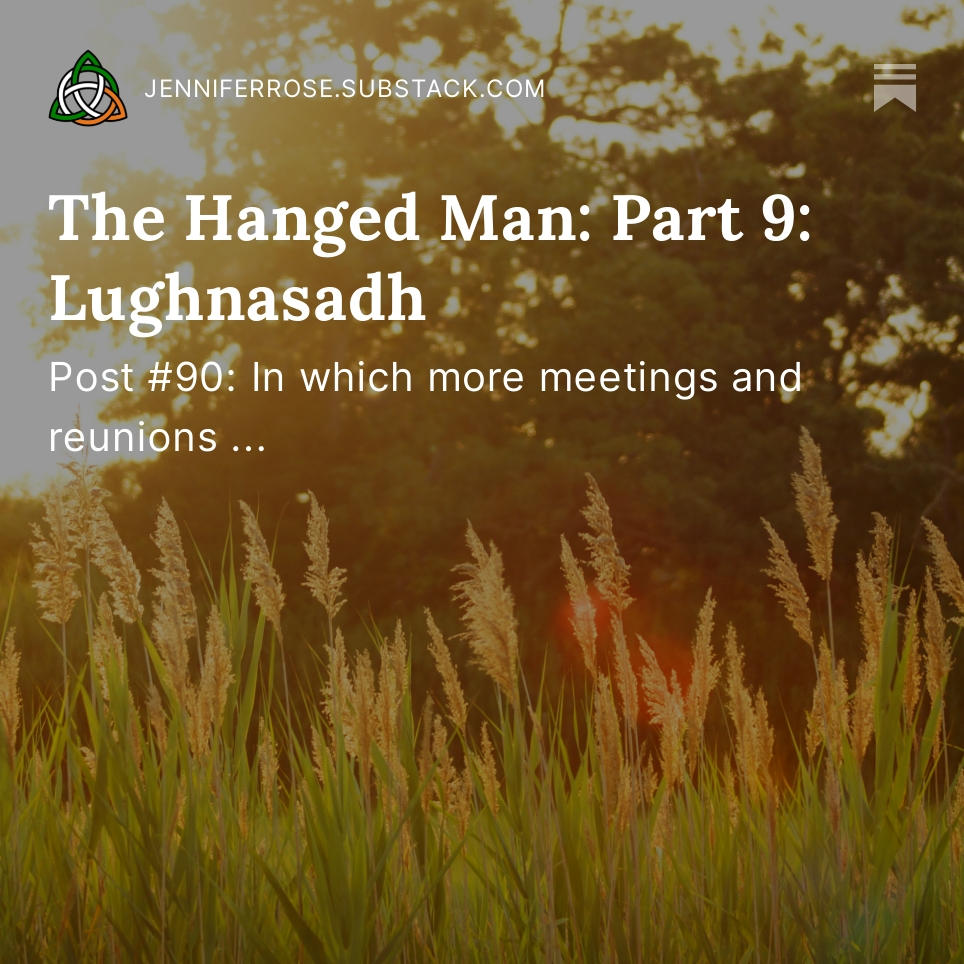
by Jenny Rose | Oct 7, 2023 | A Flourishing Woman, The Journey
This post grew out of two seeds. The first was a piece by a substacker I follow who heard a phrase on a podcast about pleasure in discipline. It struck her that she’s good at finding pleasure in discipline (think productivity), not so good at being disciplined about pleasure.
This struck me, too. I’m quite disciplined when it comes to achieving goals and being productive, but it never occurs to me to apply that same discipline to pleasure. What a thought! How lazy. How irresponsible …
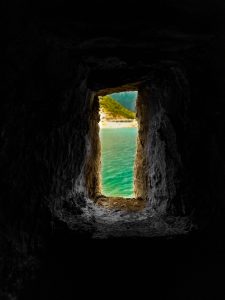
By Veljo Milic on Unsplash
Amused at my internal horror, I played with this idea for a day or two. Discipline is like a doorway, I mused. One can walk through it and into pleasure. Being a strong adherent of Work Before Pleasure (even though I know the work never ends), the doorway metaphor seemed appropriate. For a minute. Until I realized standing in the doorway of discipline, unable to move forward into pleasure, is no good, either. And that’s mostly what I do.
Sigh.
Then, I did my Mabon Tarot spread. I do this at every turn of the wheel. Mabon is Fall Equinox. It came and went while I was wading through paperwork, documents, emails, insurance, retirement investments, and the business of changing banks, cards, automatic payments, and transfer networks.
Did I mention paperwork?
Anyway, I did eventually get to pulling cards about a week after Mabon. The last card of the spread, the “overall outcome” card, happened to be the 9 of Stones (my deck), or the 9 of Pentacles (classic deck). In my deck, this card is the card of tradition, signifying reverence for past wisdom and sacrifice, and ancestral memory.
It stopped me in my tracks. Ever since my mother died in August (hence the endless paperwork), I’ve been preoccupied with family, past and present, living and dead, known and (mostly) unknown. Managing my inheritance has been fraught with guilt, shame, anguished memories, bewildered pain.
I don’t feel reverence. Whatever I feel, it’s not that. (Another thing to feel guilty about.) Whatever happened in my past context of family, I’ve found no wisdom in it. Plenty of sacrifice, though, mostly of and by me.
In the five days since I turned this card over, I’ve been thinking about it. It’s the traditional time of year for many cultures to remember ancestors, the time when the veil between the worlds grows thin, the time when the trees release their leaves to decay and sleep before the next season of growth.
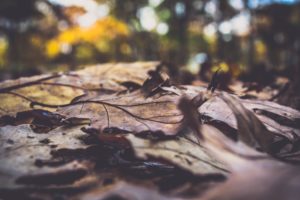
Photo by fancycrave on Unsplash
The discipline of pleasure. And the pleasure of discipline.
Reverence for past wisdom and sacrifice; ancestral memory.
I suddenly remembered an old story I used to tell during this time of year, “The Corpse Bride.” It’s a story out of Jewish tradition. A corpse bride, still wearing her wedding finery, mourns her violent death as she was on her way to her wedding. She grieves for her lost opportunities. A living bride comforts her, vowing to fully experience all that the corpse bride dreamed of and lost. The corpse bride is then able to lie back in her grave and rest in peace.
These pieces seemed to answer a question I haven’t consciously asked. Discipline. Pleasure. Unquiet ancestors. Lost opportunities.
How do we connect with our ancestors in a healthy way? We’re only just beginning to understand epigenetics and the ways in which we’re linked to the generations who came before us. I know something about my DNA, but almost nothing about ancestors. When I think of ancestors, I think of a dignified group of people, wise, healthy, connected, at peace. When I think of my family, I think of rejection, dysfunction, and abandonment. I hardly knew my family, even the ones living during my lifetime. What I mostly knew was I didn’t belong, though I was a biological child of the people I called Mom and Dad.
I feel no connection to ancestors. My unconscious assumption is they wouldn’t want me any more than the family I knew did.
However. The fact is I do have blood ties and a biological family tree, as we all do. I have inherited certain characteristics, behaviors, weaknesses, strengths, and wounds through epigenetics as well as genetics and environmental factors. I am now a twig at the end of a branch on the family tree. Neither of my sons have children. I have no daughter. My two cousins are also childless, as is my brother. I am the last female in the last generation of my direct maternal line.
Me. The highly sensitive, passionate, sensual, creative, noncompliant one nobody wanted!
I dealt several Tarot cards of healing and recovery in that Mabon spread. Perhaps they’re not solely about my healing. In conjunction with the season and this powerful card of ancestry, perhaps I have an opportunity to heal myself and comfort? give peace to? palliate? propitiate? the women who came before me, the women who gave me life.
Whatever came before, I’m here now. I breathe. My heart beats. Half the family resources are in my hands. I have the power to make choices. I choose to continue forward into generosity, healing, and joy. I don’t have ancestral traditions or maps. No one ever gave me a map, because they didn’t know the way themselves. Maybe they didn’t want to go in that direction; maybe they stopped looking for the path. It doesn’t matter now.
What matters now is to live … because they can’t. Like the corpse bride, their earthly opportunities are lost. Maybe from the very beginning I was the one with the potential to bring my female ancestors peace at last, not because I complied with their oppression, but because I refused it. Maybe it’s my wisdom that’s needed, the map in my pocket we all must follow.
The women of my family taught me some of the pleasures of discipline. Perhaps I must teach them about the discipline of pleasure, of joy. Which means I must learn it myself first.
I swam yesterday. I’m required to train weekly for my lifeguard position, but that’s only a good excuse. I swim for pure pleasure. I relished every sensual detail, every rhythmic breath, every stretch and flex of my muscles, the silk of the water. I relished the hot shower afterwards, the long drink of water I took, my clean hair and warm and relaxed body. Because they never did, even when alive. Because they never can.
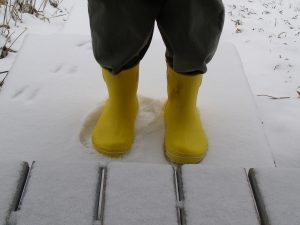
Yellow Boots
This Saturday morning I ran to the store. I took a deep lungful of the grey, humid air, heavy with the promise of coming rain. I savored it. I chatted with the cashier. I bought myself a luxurious dark chocolate bar. I deliberately splashed through a puddle in the parking lot with my bright yellow duckie boots. I smiled at strangers. I drove home with the window open and the damp air stirring my hair. Because they never did these things. (Well, maybe the chocolate. Mom did like chocolate.) Because now they never can.
I sit here on my couch with the cats, the laptop on my lap. I’m burning a scented candle, surrounded by a couple of sleeveless summer shirts I just bought on sale, my journal, lists, notes, the mail. I’m at peace. I don’t have pain. (Mom always had pain.) I’m content. I have friends I love and who love me. Life is good, filled with projects and plans. In a few minutes I’ll get up, put some laundry in, wash the dishes, stand in the doorway and look at the sky, feel the air stirring as the storm approaches. I won’t do these things because I’m disciplined and productive, or because I must, but because I can. I want to. I choose to. These are the small tasks of my life, and I love my life.
All these I’ll do for myself, and also for them, my ancestors, the women who came before me, my blood, my bone, the wombs who gave me life. Because they can’t.
They’re gone. (May they rest in peace.)
But I’m still here.
Questions:
- What does the word ‘ancestor’ mean to you? Do you connect it with a real person in your life?
- Are you prepared to be an ancestor? What wisdom would you pass on to younger generations?
- Do you feel connected to the generations of family before you?
- Would you like to be more deeply connected to living family members? What’s in your way?
Leave a comment below!
To read my fiction, serially published free every week, go here: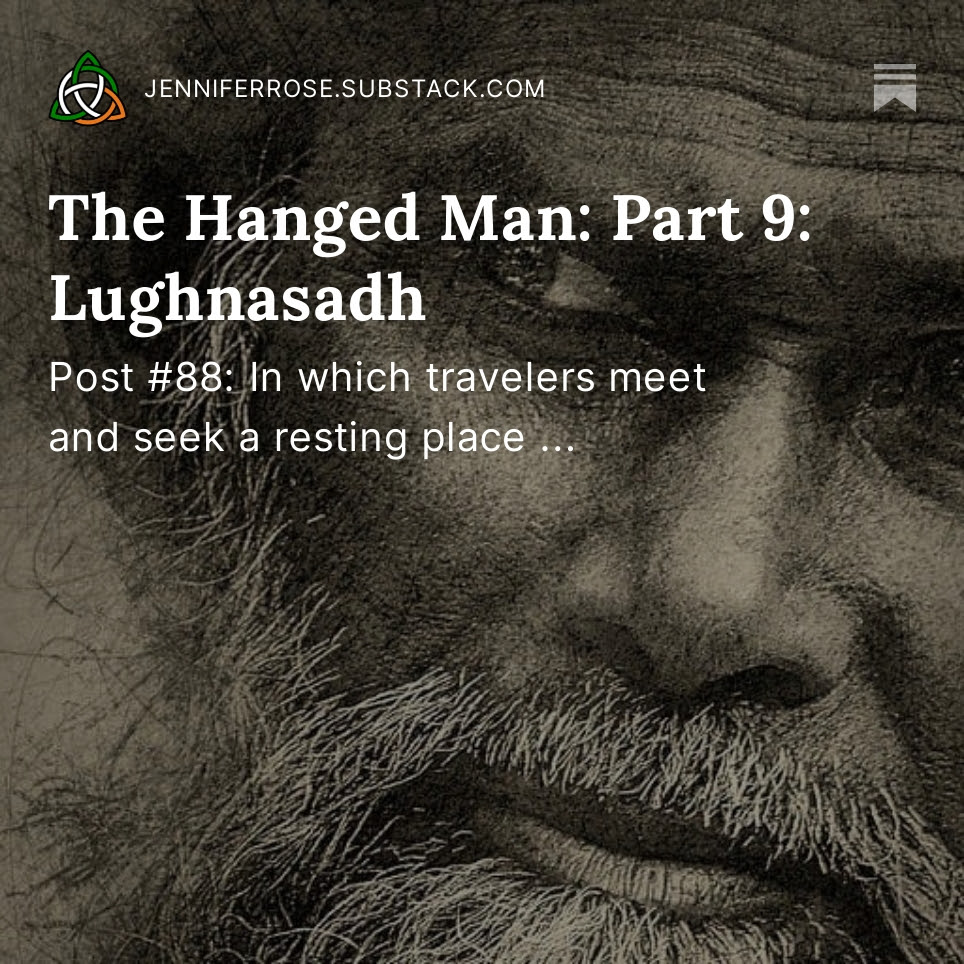
by Jenny Rose | Sep 23, 2023 | A Flourishing Woman, The Journey
Today is Mabon. My calendar informs me it’s my weekend to post on Harvesting Stones. Some weeks I’m all ready to go and need do nothing more than push the publish button. This week these are the first words I’ve written, sitting here on my little porch on Saturday morning watching the clouds tatter before the morning sun.
Mabon, or fall equinox, is the balance point during which the hours of daylight and darkness are equal. It mirrors spring equinox and falls between winter and summer solstice. Fall is my favorite time of year, and this fall I’m in the midst of profound transformation. It’s a harvest season like no other in my life.
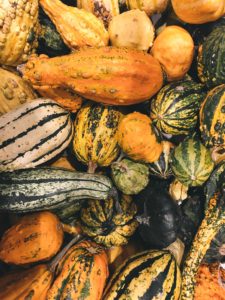
Photo by Brigitte Tohm on Unsplash
Sometimes we are so swept up in the tides of life and death we can do nothing but keep breathing. Days fall away from me, hours drift by and disappear without my awareness. I am focused on the next task, and the next. At the end of each day, I cross to-dos, questions, concerns off my lists, make notes for the next days and weeks, and fall into bed before rising at 4:30 or 5:00 to begin again.
In the midst of the chaos, I remember I choose my life. I’m getting better at just stopping.
Stopping.
I have before me a weekend. Mabon, 2023. It will never come again. A hundred tasks to do. A hundred things to worry about. A hundred choices to make.
Mabon is about balance. Action balanced with rest. Complexity balanced with simplicity. Fear balanced with confidence. Work balanced with play. Grief balanced with joy.
The light; the growing season; the summer of hospice, anguished love, extra caregivers, demented phone calls, medication lists, and, finally, my mother’s death, wane. Trees retain their leaves, but summer’s fierce green fades, bronzing, drying. Sedum and chrysanthemums bloom in the garden. A few sunflowers still flower among the ripening seed heads of their fellows.
Mabon. Balance. And I, a creature, a life among so many other lives, what can I say about it? How can I talk about balance when it feels so far from reach? How will I find balance again on the other side of transformation?
What I hold are impressions, vivid moments of mindfulness and sensuality, unexpected emotions, and the determination to cling fast to myself as autumn rip tides carry me where they will. For I am here, alive, curious, creative, awed, grateful, terrified.
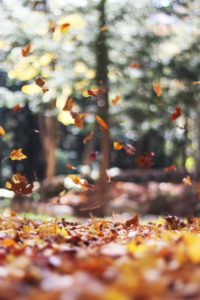
Photo by Autumn Mott on Unsplash
I’m rereading Susan Fletcher, a favorite author. I just finished Oystercatchers. On the last page, this: “You’re this: an onion bulb. The glint of a rabbit’s eye. The clicking of a beetle’s legs on a leaf; the leaf’s brown edge; dandelions; a pebble; windfall fruit.”
I read no more; I was crying too hard.
My mother is always with me. She has always been with me. My blood, my bone, my sculptor. Now, her death is with me, too, and her dying. Grief has not come to the front door, which I’ve left ajar in anticipation of its coming. It’s crawled through cracked windows, slipped through old screens long-dead cats tore with their claws. It’s drifted down the chimney, come up through gaps in my old wood floor from the cellar, crept along the copper radiator pipes, cool now, but soon to be warming.
I carry bewildered pain within me, like a ripe nut in its shell. How does it happen that a human being, intelligent, talented, competent, with so much to give, can have no feel for life? How can anyone refuse to engage with the mystery, the glory, the terror, the sweetness, and yes, even the pain of what it means to be alive, to love, to be broken and heal over and over?
Isn’t it strange that I find her in the small delights she herself would never have recognized as sustenance, as miracles? Something in Mom was too blind or too broken or perhaps too frightened to allow life to clasp her in its arms. Something. We could never talk about it. I knew it was there, but she would not reveal even the edges of her true experience.
In the end, as the fogs of dementia surrounded her, she was at last able to say she loved me. I have that, at least. And yet, she was demented … But I choose to believe.
Mabon, then, is the autumn garden. Planting blue and white grape hyacinths in drifts with daffodils under the magnolia so in spring they will bloom and naturalize as the seasons come and go. Shoveling and spreading compost mixed with aged cow manure, rich with earthworms and beetles. Pruning, trimming, prying weeds and grass out of cracks in the sidewalk and driveway. Disturbing our small brown toads as I weed and clean up debris in readiness for the blanketing fallen leaves. Dividing and transplanting. Spider webs jeweled with dew. Chilly mornings and gorgeous afternoons. The smell of my catnip, ecstatically trampled and chewed, no doubt discovered by the neighborhood black cat, Winston by name. Planting a few end-of-season sale perennials from our local greenhouse: lavender, black-eyed Susan, sedum. My garden manicure of dirt ground under my fingernails and into my cuticles, always dry and ragged from so much time in the pool. It won’t scrub away, but it will soak off in the pool during my next lesson. Peeling skin and blisters. Bruised knees.

Photo by Dakota Roos on Unsplash
Mabon is the early morning mist rising from the Kennebec River three or four blocks away. It moves up from the surface of the water, along the dark, early-dawn streets and walkways, enveloping the trees, rising to hide the church spire and then gently dissolving as the sun rises while the crows call and the neighborhood rooster announces the dawn.
Mabon is the taste of Apple Pie Chai (Republic of Tea) with a dollop of half n’ half in it, as delicious as it sounds. It’s scented candles burning in the first hours of my day as I journal, make lists, think about the day ahead. Orange, red, and golden candles – orange and spice, apple and cinnamon, sandalwood. One of my closest friends says sandalwood is a “dirty hippy smell.” The thought makes me smile every time I light it. The apples and cinnamon candle sputters companionably because it has a wooden wick (Book&Reverie candles on Etsy).
Mabon is linen sheets dyed a glorious old gold on my bed, textured, heavy, luxurious. It’s socks and sneakers instead of my Keen sandals. It’s my heavy grey shirt jacket with a Buff bandana or a scarf.
Mabon. The Wheel of the Year turns. Seasons and cycles. These things remain. These things are predictable, comforting. They sustain me.
This year, Mabon is also a blizzard of what feels like endless documents, digital, paper, filed away, stacked on my desk, put into binders, stored on USB sticks. Soon, Mom’s house in Colorado will sell, the requisite paperwork will be filed for tax preparers and other legalities. Printing and scanning, FedEx drop offs, notarizing, will eventually be complete. The business of opening accounts with a new bank, obtaining new cards and checks, changing automatic payments and direct deposits, connecting to other accounts, will be finished. Insurance, retirement accounts, paying off debt – all will be managed. I will create new systems, effective and simple.
This week my nearly 20-year-old Subaru failed to pass inspection. I can’t understand it. The driver’s side door handle still works; I don’t really need the others. It drives. I don’t need AC or an audio system. I can manage without being able to open the back hatch. The heat and defrost work if I put in the fuse, and the battery is good as long as I don’t leave the fuse in when I park it. I know exactly where to bring my fist down on the hood when an ice storm seals it shut and I need to open it and put the fuse back in.
It needs $3000 of work. It’s worth $1100.
I need a new car. More tasks. More paperwork. Insurance. Registration.

Photo by Nathan Dumlao on Unsplash
These things, the documents, the tasks, the paperwork, phone calls, texts, emails, are nothing but the chrysalis of transformation. I know it. I feel stressed and overwhelmed much of the time, frustrated by delays, miscommunications, jumping through legal and bureaucratic hoops. It’s all temporary, though. It will fall away, along with the autumn leaves. The chrysalis will shred in the dark winds of late autumn and winter, this rip tide will release me, and then … something new.
Through it all is my mother. My memories of her. The pain of my love for her. I’ve inherited so much more from her than assets. There is some comfort, some strange, painful comfort, in remembering to pause. To choose. To stop. To be touched, broken open by the small daily beauties and comforts of life. The taste of creamy tea. The scent of sandalwood. The texture of rich soil. The late copper and garnet blooms of mums. The mist rising into the sun’s golden warmth. Most of all, the painful risk of loving friends, family, the world, life.
Look, Mom. See the little toad? Let’s put him here, under the rhododendron. Remind me to buy toad houses.
To read my fiction, serially published free every week, go here: